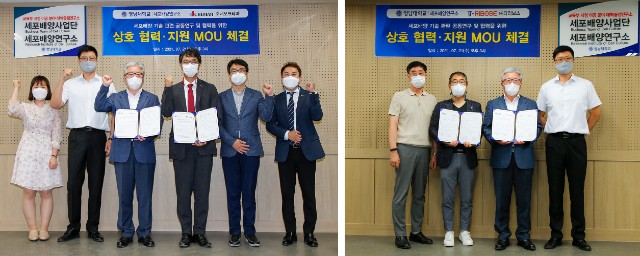YU Research Institute of Cell Culture enters joint research agreement with specialized corporations such as Neo-Cremar and T-Ribose
Pursuing localization research of core materials and technologies for ‘cell culture medium’ that depends completely on imports costing 400 billion KRW a year
Requires government-academic-industrial cooperation to create new industries and lead the bio-industry
[July 22, 2021]
 The bio industry research led by the YU Research Institute of Cell Culture (Chief Choi In-ho) will gain momentum in its technological commercialization.
The bio industry research led by the YU Research Institute of Cell Culture (Chief Choi In-ho) will gain momentum in its technological commercialization.
On the 21st, the YU Research Institute of Cell Culture entered joint research agreements for the development of core materials and technologies related to the cell culturing industry with two specialized companies such as Neo-Cremar (CEO Kim Jae-hwan) and T-Ribose (CEO Kim Yong-gwan).
Neo-Cremar is the only functional food materials company in Korea listed in KOSDAQ. It is currently actively researching alternative meats and it is planning to launch vegan meat made with plant-based proteins. With this MOU, it plans to commercialized cultured meat through joint research with YU to pioneer not only the domestic market, but also overseas markets. T-Ribose is a newly established company aiming for the localization of cell culturing medium, and it is constructing a GMP (Good Manufacturing Practice; rules for manufacturing and quality management of pharmaceutical products, etc.) needed for producing cell culturing mediums in the Uiseong Bio Valley that is currently being constructed in Uiseong-gun, Gyeongbuk.
Cell culturing technology is involved with growing animal cells outside of its body and it is a core technology used not only for basic research (basic life science, medicine, pharmacology, etc.), but is also used heavily by companies that produce biopharmaceutical products (antibody, vaccines, protein, stem cell medicine, etc.). The best-known case is the production of coronavirus vaccines using cell culturing by SK Bioscience, and in Korea, Samsung Biologics and Celltrion have the nation's largest culturing facilities needed for producing bio-medicine. In addition, if production of ‘cultured meat (meat produced by culturing muscle stem cells)’ that has recently become a big issue is realized in the near future, it is expected that the rate of cell culturing in the bio industry will grow.
This is why the industry-academic joint research agreement between YU that has the nation’s best research and technological capacities in cell culturing and companies with expertise in relevant fields is gaining so much attention.
Department of Medical Biotechnology Professor Choi In-ho, who heads the YU Research Institute of Cell Culture, stated, “The history of bio-industries in Korea is relatively short, but has made remarkable achievements. But ironically, compared to the scale of cell culturing facilities in Korea, it still depends almost completely on imports for actual cell culturing.” He added, “Especially in the case of ‘cell culturing medium’ that is basically the food for growing cells, the amount imported by Korea is about 400 billion KRW per year. It is expected that demand will grow with the development of the bio-industry in the future, but in reality, we are still importing most of the raw materials needed for producing mediums.” In order to lead the bio-industry, which is a cash crop for the future, assertive cooperation is needed from not only best-known universities and companies, but also the central and local governments.”
Professor Choi has been planning various businesses for the construction of the domestic infrastructure, as well as in the development of core raw materials and technologies that are essential for cell culturing together with Gyeongsangbuk-do and Uiseong-gun since 2016. Professor Choi founded the Research Institute of Cell Culture that is joined by professors in medical biotechnology, food engineering, pharmacology, and chemical engineering as researchers back in 2017. The YU Research Institute of Cell Culture was selected as the ‘College Central Research Support Project in Science and Engineering’ by the Ministry of Education in 2020, and it will receive funding from the central and local governments for nine years until 2029, and is thus spurring its efforts to develop core technologies and materials needed for cell culturing.
Professor Choi said, “The YU Research Institute of Cell Culture, Neo-Cremar and T-Ribose are developing exclusive mediums for cultured meat through joint research. The industry-academic-government cooperation will create new industries for the local society and it will serve as a hub for core materials and technology development of the domestic cell culturing industry.










